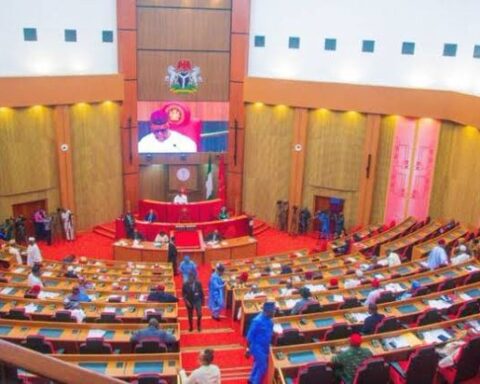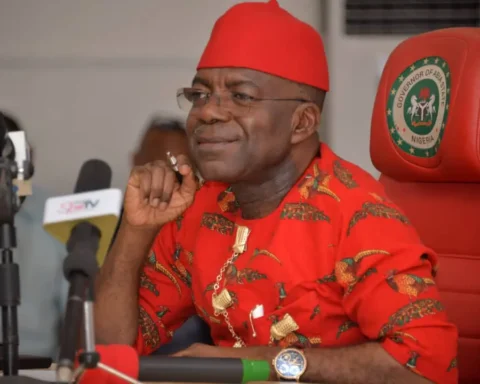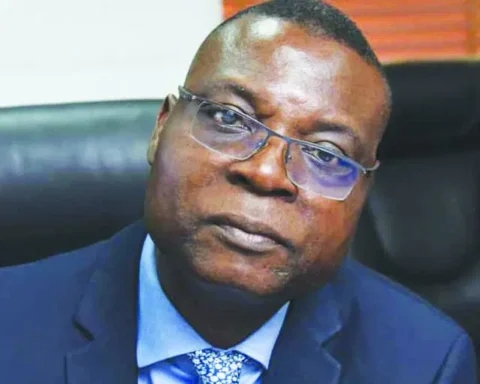There’s this young Nigerian skit maker, as if all of them are not youngsters, whose presentations are either extremely funny or extremely provocative. For him there is no middle course. His words are usually razor sharp. He verbalises his tendencies for violence and also physicalises them. His words are caustic and his resort to physical violence ever present. He always appears to be eternally angry at himself, at everything, and at everybody. I don’t know his name, and I have not consciously tried to know him by name. But he has a unique selling point [USP] which is beyond his scathing skits, and the manner of their presentation. His dress [non]sense and sartorial inelegance give him away as a perpetually angry Nigerian. With no exception that I know of, he religiously and to the annoyance of some people appears in his video skits in ‘shortknickers’, [grant me the indulgence to use this peculiarly Nigerian combo of the words ‘shorts’ and ‘knickers’] with his rope-like belt fastened nearer his chest than by his waist.
This young man has many skits under his belt. Oh! That could be the reason for choosing to fasten his belt in his chest rather than his waist – to leave enough room to accommodate his angry skits. There are many of his skits that would be award winners were there to be a rating and appraisal agency. But that would depend on who is the assessor. This man’s entries will fall at the first huddle if an agency affiliated to this regime were to be in charge. Of course, he will be utterly foolish, and indeed fatalistic to attempt to compete in such a setting. As I said above, this skit maker has many memorable skits under his belt. But we will try to verbalise two of his skits that we have come in contact with. One of them was in a setting ostensibly in the precincts of a Nigerian courtroom. Two things could be gleaned from this skit-the slow pace of litigation, and the glaring corruption in our court system. A man, the skit maker himself, was sitting on a bench within a court apparently waiting for his suit to be called. He had company. After a while the man looked up from his jotter where he was writing whatever he was writing, yawned, stretched his limbs, and then asked his companions what they would like to eat for lunch. They placed their orders of the usual – rice, beans, plantain, meat, etc.
Then the man requested one of the young ladies to run the errands. But before she set out the man asked if any of them knew the lunch preference of the judge. One of the girls said yes, that the judge loves ‘dodo’ [fried plantain], rice with stew and assorted meat which must include the intestines of a goat. The man approved that the judge’s food should be part of the order but he reminded the errand woman that she should never forget to include a sealed envelope containing the bribe money for the judge which should be delivered with the lunch pack. A non discerning viewer could just be carried away by the bribe money aspect and lose sight of the slow aspect of going through our courts.
The other skit that spoke to Nigeria’s situation even if it was not peculiarly Nigerian was this same man’s encounter with a ranking Nigerian government official. In this setting the skit maker was grumbling at the privations visited on Nigerians as a result of the economic policies of this regime, especially the effects of the removal of petrol subsidy and the massive devaluation of the Naira. The government official took his time to ‘educate’ citizen skit-maker on the potential and prospective benefits of the policies that were being implemented. He assured that everything will eventually turn out well for the people. But what angered the skit maker was when the government officer said that there was light at the end of the tunnel. Walking away in fury, the dejected citizen shouted back at the government’s snake oil salesman: ‘must the light always be at the end of the tunnel? Why not at the beginning of the tunnel?’
No, there will not be any light at the beginning of the tunnel. Certainly not now nor any time soon. What’s currently in the front burner of our country is politics and the 2027 election. Well, it’s been there anyway since after the 2023 presidential election. Nigeria’s president, Alhaji Bola Ahmed Tinubu, had as far back as then challenged the leadership of the Nigerian Labour Congress [NLC] to throw their hats into the political ring during the presidential election if they believed that they had the interest of the Nigerian workers at heart more than himself. This was during the protracted battles to raise the national minimum wage. Tinubu suggested that workers would choose him ahead of the Labour leaders. So, for Tinubu, politics had never been on the back burner. The serial defections of local government councillors, chairmen, state assembly lawmakers, governors, national assembly legislators and sundry elements to the ruling All Progressives Congress [APC] political party did not just happen. If the defections were ordinary we would still be hearing about the allegations of financial fraud against the former Delta state governor, Dr. Arthur Ifeanyi Okowa, by the Economic and Financial Crimes Commission [EFCC]. How much of that alleged heist is still in the public domain since Okowa ‘persuaded’ his successor as governor to move the People’s Democratic Party [PDP] structure on which he was elected, stork and barrel, into the APC? The Okowas abound everywhere in the extant political dispensation.
Anything apart from plotting to capture and retain the presidency in 2027 will be a distraction. The plan to dominate the digital sphere was unveiled in the presidency in Abuja last weekend. Truth is already marked down to be destroyed with lies and propaganda. Spin doctors have been mobilised. The payout will be irresistible. This same regime that not too long ago mocked data has already started throwing statistics of dubious quality on and at Nigerians. The gang that only yesterday derided data by saying ‘na data we go chop’ is now eating data that bears no relevance to the living conditions and standards of the people. Regime apparatchiks, cheerleaders and choristers have become experts on the rising nominal gross domestic product [GDP], accretion to the foreign reserves and the bullish Nigeria Exchange [the stock market]. But they lose their voices when it comes to talking about the material living condition of a typical Nigerian. Here, their assumed expertise fails them. They avoid such discussion like it is a plague. And it actually is a plague.
Or how do we explain the fact that about two weeks after an officer of the government reported that 161 million Nigerians, or 74% of the population of the country, would go to bed on a particular July day not knowing where their next meal would come from. If the situation has changed between then and this August day, it will only be for the worse. This dire report of starvation and dying of Nigerians in their hundreds or thousands or even millions have been swept off the media headlines by the politics of 2027. The same thing happened months ago when some Nigerian academics published research findings that child malnutrition as well as kwashiorkor was on the rise.
The findings did not gain traction and did not capture our imagination because it was not politics and it was not about 2027. I believe it was the celebrity journalist, Dele Giwa, who was killed by a time bomb, who wrote over 30 years ago that Nigerians were unshockable. This assertion is even truer today than when it was first written. Otherwise, how do we explain that we are obviously not perturbed by a statement by this regime that 161 million compatriots are starving, not sure of their next meal [that’s assuming that they ate the previous meal], and may be facing certain death. They will become burnt offerings for our rulers.
Nuhu Kilishi is the director of nutrition and food safety in the federal ministry of agriculture and food security. Last month, in Abuja, he painted a grim picture of the deteriorating situation of food insecurity in the country. He said that the proportion of Nigerians facing moderate and severe food insecurity was on the upwards swing, more than doubling from 35% in 2014 to 74% in the first half of this year. He said “only about 20% of Nigerians are currently food secure, meaning that they are certain of their next meal”. Some experts vigorously dispute the 20% food secure Nigerians measured against the type of food available to even about 10% of this 20%. Food can be available but is of dubious nutritional value. They may sometimes taste alike but food and chaff are not the same.
The ramifications of 161 million or more Nigerians starving possibly to death are far, wide and foreboding. Food insecurity impact every aspect of life and living, the economy, security and the general social fabric of the country. We are not alarmed after being told that 161 million Nigerians are, in simple terms, grappling with malnutrition, weakened immune systems, and exposure to illnesses; emotional distress, anxiety, depression, and mental health issues; impaired cognitive function, low energy levels, and reduced productivity; shame and embarrassment resulting in social isolation; and, vulnerability that makes victims susceptible to exploitation, abuse, or trafficking. Stripped of its fancy jargons, this is what it means to be food insecure. This is the fate that has befallen 74% of Nigerians irrespective of the population figure you are using – 210 million or 220 million or 235 million. There’s no reason to believe that our rulers are fazed by the fact that our country’s last population census was in 2006. Of course, like previous headcounts including those conducted by our colonizers, the 2006 exercise was mired in controversy and the figures widely and vigorously disputed. Ideally, a census should happen every 10 years. But Nigeria has little affinity with normalcy. How much longer will it take for virtually all Nigerians to become burnt offerings on the altars of our thoroughly insensitive and wicked rulers.



























